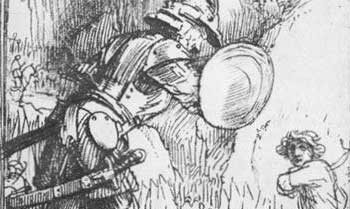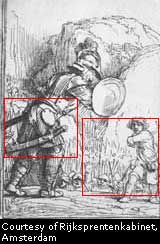
The Battle is the Lord's
Following his victory over Goliath, David does not take the giant's sword as a trophy; instead, it is deposited in the sanctuary as testimony to God's salvation. Only later, when David becomes a fugitive from the jealousy of Saul, does he take the sword in his moment of need.
David said to Ahimelech, 'Haven't you got a spear or sword on hand?' ...the priest said, 'There is the sword of Goliath the Philistine who you slew in the valley of Elah; it is over there, wrapped in a cloth behind the ephod. If you want to take that one, take it, for there is none here but that one.' David replied, 'There is none like it; give it to me.' (1 Samuel 21:9,11)
But David does not wield the sword against his pursuers. He will find himself in a position to slay Saul twice, but he stays his hand. His righteousness will not allow him to lay a hand on the anointed one of God. He will be defamed by his enemy Nabal the Carmelite, but he will hold back from using the sword, placing his faith in God to restore his honor. He will be cursed by Sheva the son of Bichri but he will not slay him, again accepting his fate with dignity and waiting for justice to be served.
David the son of Jesse will be acclaimed time and again as a great warrior, but his initial triumph over Goliath has taught him the unforgettable lesson regarding all of his enemies, that no matter how mighty the sword, ultimately, 'the battle is the Lord's'.
